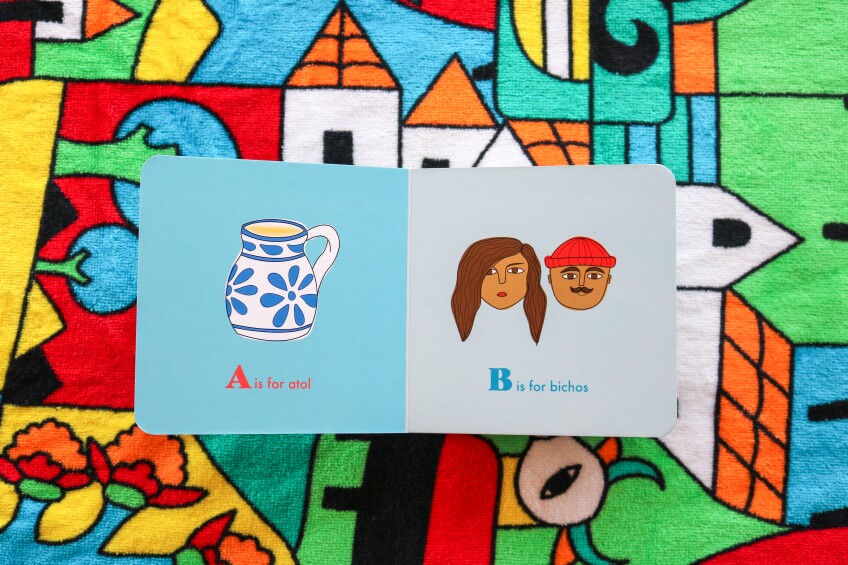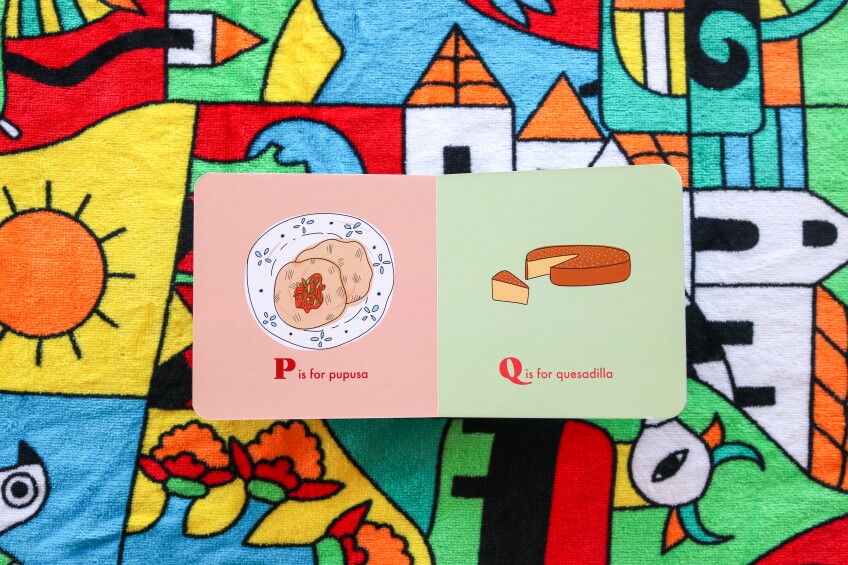The Book 'ABCs of El Salvador' Expands Cultural Horizons, One Letter at a Time

In the ABCs of Maggie Carranza's childhood, the letter "P" stood for pupusa parties.
As one of the only Salvadoran families in Mission Viejo, the Carranza home often served as a bridge to El Salvador for friends of different cultures who were unfamiliar with the Central American country. Guests delighted in traditional Salvadoran treats, including cheese-stuffed pupusas topped with a pickled cabbage curtido, ensalada fruit drinks, and sweet quesadilla cake for dessert. Breaking bread — or in this case, tearing open cheesy pupusas — offered a common ground for the Carranzas to share their world while learning about others.
"We would be the first ones to introduce them to the culture," Carranza said. "That was a really fun thing growing up."
This sense of curiosity and cultural pride followed the artist into adulthood and led her down an unexpected path to publish her first book, "ABCs of El Salvador." The colorful board book offers a beautiful illustration for every letter of the alphabet and its related Salvadoran word: "A" is for atol, a cornstarch-based hot drink, "B" is for bichos, slang for kids; and "C" is for charamuscas, frozen slushie drinks in plastic bags. Each page of the book is a window into El Salvador, its colloquialisms and its culture for young beginners and nostalgic experts alike.
"As a bicultural, first-generation kid, I just wanted to bring honor to my parents, my family and my culture," she said.






Carranza drew from her childhood experiences for the book and said she hopes it can inspire others to embrace their differences. Her first visit to El Salvador was at 6 years old, and she flew back once a year whenever the family could afford the trip. She's grateful she had the opportunity to connect with her roots there and share her experiences with friends here in the U.S.
"Learning from my parents, they would always make it a point, 'You need to not be in a bubble. Expand your horizons and talk to other people, and learn from them,'" she said.
"ABCs of El Salvador" did not begin as a children's book. In fact, the project did not begin as a book at all. After earning her marketing degree from Vanguard University, Carranza scratched a creative itch by taking graphic design classes as a hobby. In June 2019, she illustrated "P is for Pupusa."
She said she remembers thinking, "Oh, this is fun! I can create a couple more letters."
Now she laughs and gives a "shoutout to the fam" for nudging her to finish the alphabet. She completed an illustration for each letter by September 2019 and began exploring what it would take to turn the project into a published book.

"Google was my best friend," she said. "How do I publish a book? How do I publish my own stuff? How do I print a book?"
Carranza decided to self-publish in a durable board book format. By November 2019, she printed her first 500 copies of "ABCs of El Salvador." While she initially envisioned it as "a picture book for anyone," many clients have purchased it for children.
"Some people buy it because they have kids, or for their future kids, or their friends' kids," she said. "Some people buy it, and they're like, 'I don't have kids, but I just want it on my coffee table.' They just want to have a collection of things from the country to share with others."
Embrace your heritage. Share it with friends.Maggie Carranza
She found significant support in the Salvadoran community on Instagram, where she gained a following for her illustrations and related products on her Etsy shop.
"I'm so appreciative and humbled," she said. "I love seeing how [the book] has impacted so many people and brought a little piece of home to them."
As an aunt to three nieces and one nephew, all under 7 years old, Carranza encourages parents to talk to their children about racism and other social issues in a developmentally-appropriate way. In addition to using books like her own as tools to discuss different cultures, she recommends the "Sesame Street" initiative on racial justice to help teach kids about the issue. Also, she recommends families try new restaurants and visit cultural neighborhoods with their kids, where they can discuss different flavors, different decorations and different traditions.
This sentiment carried into "ABCs of El Salvador," from cover to cover. The book closes with a prompt for readers that embodies Carranza's cultural curiosity.
"Embrace your heritage.
Share it with friends.
Love those who are different than you."
"They're never too young to understand these things ... Tell them the realities but also tell them how they can be the change," she said, "Instead of ignoring it, and then they become adults who don't know how to handle these conversations."

Carranza also supports exploring these topics among adults.
"Don't be scared to have a conversation with people," Carranza said. "Sometimes, things are hard to talk about. This last year we all learned how hard it is to bring up conversations about racism and inequality… but it's better than just ignoring what's going on."
Maggie Carranza's Cultural Book Picks
Carranza handpicked the books below to help families cultivate the cultural curiosity that shaped her childhood.
"For the Love of Plátanos" (Ages 0-6)
Written by Natalie Carey and illustrated by Bianca Guerrero
"Round is a Tortilla: A Book of Shapes" (Ages 3-5)
Written by Roseanne Thong and illustrated by John Parra
"Green is a Chile Pepper: A Book of Colors" (Ages 3-5)
Written by Roseanne Thong and illustrated by John Parra
"Too Many Tamales / "¡Qué montón de tamales!" (Ages 4-8)
Written by Gary Soto and illustrated by Ed Martinez. Translated by F. Isabel Campoy and Alma Flor Ada
"Islandborn" (Ages 5-8)
Written by Junot Díaz and illustrated by Leo Espinoza
"Waiting for the Biblioburro" (Ages 5-8)
Written by Monica Brown and illustrated by John Parra
"The House on Mango Street" (Ages 14+)
Written by Sandra Cisneros

